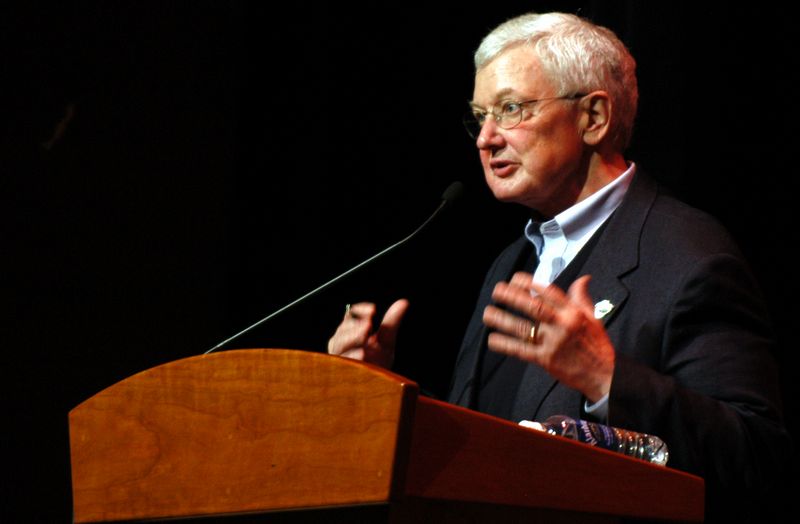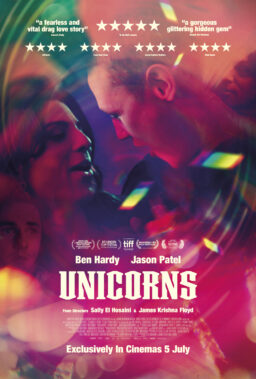CHAMPAIGN — Roger Ebert’s seventh annual Overlooked Film Festival unreeled here last week with appearances by auteurs and actors such as John Sayles, Guy Maddin, Mario Van Peebles, Jason Patric and Jason Scott Lee, among others.
Sponsored by the University of Illinois’ College of Communications, programmed by the Sun-Times film critic and presented at the Virginia Theatre, the festival celebrates movies that were somehow ignored, lost or not widely seen after their original release.
A remnant of the movie palace era, the 1,550-seat Virginia opened in 1921 as a vaudeville house and is on the National Register of Historic Places. “My dad once saw Houdini and the Marx Brothers here,” Ebert said. Between shows, organist Owen York, played movie-house staples and vintage rarities such as “I’m Through With Love,” popularized by Bing Crosby in 1931.
Through with love? Hardly. For the love of cinema, thousands of fans and scores of filmmakers came from near and far, from Champaign and Chicago, yes, but also from England, South Africa, India and points beyond.
Some outtakes and observations:
Making the documentary “Murderball” (2005), about the sport of wheelchair rugby, was a dream come true for athlete-coach Joe Soares. “I’ve prayed to God in church that someone would come along and make this movie,” he said. “We work as hard as any athlete. This movie will do a lot to change the perceptions of people in chairs.”
He and the rest of the “Murderball” cast and crew hope that the movie will help to dispel the false piety often directed at the disabled. Of his unceasing rivalry with former teammate Mark Zupan in “Murderball,” Soares said, “Mark let me know from Day 1 that he hated my ass. I wish the whole world would be like that.”
Zupan was injured after being thrown from the back of a pickup truck driven by a drunken friend. “The first two years suck,” Zupan said of his rehabilitation. “You have to learn everything over, like an infant. But there’s a whole new world out there to discover. There’s no reason to give up hope. I wouldn’t be here talking to you if I hadn’t made this movie.”
Up from the cement pond
Guy Maddin, director of “The Saddest Music in the World” (2003), came late to moviemaking, at age 30. “I always wanted to mythologize my hometown of Winnipeg,” he said. “But I had no role models there. The only thing I knew about making movies was how Jethro Bodine [Jed Clampett’s doofus nephew on ‘The Beverly Hillbillies’] made them, while carrying a riding crop and wearing a beret.
“Winnipeg is so isolated, there’s no population, it’s in the hinterlands. But I thought that all cities were like this until I started traveling to promote my movies.”
Watching Mark Zupan’s face light up at the description of the next film (“The Saddest Music in the World”) on that afternoon’s bill: A Depression-era fantasy about an amputee who has glass legs filled with beer.
Jason Patric, who appeared with “After Dark, My Sweet” (1990) at the festival, feels that his unconventional role choices, such as in “Rush” (1991) and “Narc” (2002), have been a rebuke to the Hollywood establishment. “After ‘Rush’ disappeared quickly, people thought I was a drug addict [just like his character in this movie],” he said. “I’m not going to let People magazine into my living room to prove them otherwise.”
Hi, Mom!
Patric gave one of his most unforgettable performances in Neil LaBute’s brutally caustic “Your Friends & Neighbors” (1998) as Cary, the hedonistic lothario who at one point berates a bedmate for staining his “320-count sheets.” Later on, though, Patric became the object of opprobrium himself. “When I sat down for the premiere for ‘Your Friends & Neighbors,’ they put me next to my mother. Now that was uncomfortable.”
“I didn’t want to make a message movie,” said Darrell James Roodt, director of “Yesterday” (2004), which received an Oscar nomination for best foreign film (and will be shown on HBO later this year). “The issue of AIDS in South Africa is at a crisis point. So instead I decided to make a human drama that would have much more resonance and spark a dialogue in my country.”
Thank you, drive through
“There’s this mentality that if you can’t sell a movie via McDonald’s with a Happy Meal toy, then you can’t sell a movie to kids,” said producer Maggie Renzi of the decidedly unorthodox approach of the family-friendly “The Secret of Roan Inish” (1995).
While filming “Baadasssss!” (2003) in a seedy Los Angeles neighborhood virtually unchanged from when his father Melvin shot his “Sweet Sweetback’s Baadasssss Song” (1971) on the same spot 30 years earlier, director Mario Van Peebles heard a wino cry out in the background. “‘Oh, s—, Sweetback’s back, just like he said he would be,’ ” a reference to the promise that the hero makes in the original film’s final scene.
The adventures of Ossie & Mario
The legendary Ossie Davis, who died Feb. 4, had one of his last roles in “Baadasssss!,” and like the rest of the cast and crew, worked for scale on the movie. “He even flew out to L.A. on Jet Blue,” Van Peebles said. “Then he told me, ‘Clean up your house, because if you ain’t got no hotel money, I’m staying with you.’ “
During the Q&A session after “Baadasssss!,” actor Jason Scott Lee, sitting in the audience, voiced his endorsement: “Mario Van Peebles is true to his word; he gave me one of my first jobs, on an ‘Afterschool Special’ that he directed.”
But not everyone is as charitable. Van Peebles reported that “my dad charged us every time we used a clip [in ‘Baadasssss!’] from his film.”
Director Vincent Ward on his “Map of the Human Heart” (1993) star Jason Scott Lee: “He’s the nicest and most talented actor I’ve ever worked with. I’m not just saying this because he’s sitting here. He got the [Inuit] accent down so well that the locals wanted to go hunting with him.”
“I did not go to film school; I’m not even a film buff,” said performance artist turned director Miranda July of her debut film, “You & Me and Everyone We Know” (2005). “I’ve never watched a million movies. I made ‘You & Me and Everyone We Know’ by being inside of it. It’s a very ground-level view from the inside out.”












